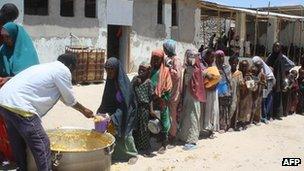Most EU aid 'goes to richer nations' - MPs
- Published

The committee says the UK must put pressure on Europe to reform its aid system
More than half of Europe's development aid budget is going to "relatively rich" countries like Turkey and Serbia, British MPs have warned.
The International Development Committee said the situation "could devalue the concept of aid" and called on the UK government to demand change.
The UK gave £1.23 billion in aid via the EU in 2010.
But EU commissioner Andris Piebalgs said it was "not true" to suggest aid is going to the wrong people.
International Development Secretary Andrew Mitchell said the EU was "already reforming the way it spends aid, making it more transparent, results-focused and targeted at the poorest people".
The committee reveals that only 46% of the UK contribution to EU aid for developing countries goes to low-income states - a figure it calls "unacceptable".
The rest, it says, goes to "middle-income" states, adding: "Turkey has consistently been in the top five recipients of European Commission aid (£182 million in 2010) as has Serbia (£178 million in 2010)."
The MPs also criticised the administrative bill for the EU programme, pointing out they were twice as high as the Department for International Development's own costs. The European Commission estimate administrative costs in 2009 were 5.4%.
EU aid for Turkey this year totals 860.2m euros (£703m; $1.14bn) and for Serbia it is 202m euros. In the 2007-2013 funding period the total for countries in the queue to join the EU is 11.5bn euros.
'Undermine support'
The MPs' committee urged the UK government to challenge the definition of official development assistance (ODA), through which the relevant EU aid is spent.
"It appears to be being used as a way of fudging the figures to help other European countries meet the (internationally agreed) target for 0.7% of GDP to be given as aid," chairman and Liberal Democrat MP Malcolm Bruce said.
But commissioner Piebalgs said supporting developing countries was an "important part" of the EU's work and delivered separately to those "clearly aimed at fighting poverty".
"I have proposed to concentrate EU aid in the future to the poorest countries in the world, to make sure our money goes to the most in need and where it makes a real difference," the commissioner added.
"The MPs said Mr Mitchell had argued "it would take forever and be difficult" to change the definition of ODA so as to exclude relatively wealthy countries.
"We do not accept this: the government should be bolder and less risk averse by tackling the criteria for ODA so that more funding goes to the world's poorest people and the poorest countries, and less to the European neighbourhood," Mr Bruce said.
"Failure to do this may undermine the UK public's support for EU institutions."
Mr Bruce added: "British taxpayers want the aid they give to go to the places where it can make the most difference, to countries where millions of people are getting by on less than a pound a day.
"Giving aid to relatively rich countries like Turkey could devalue the concept of aid."
'Relentless pressure'
Oxfam policy adviser Claire Godfrey said the organisation fully supported the call for aid to be better targeted.
"If aid is not about helping the poorest then it is not worthy of the name," she said. "But reopening the definition of ODA is not necessary and could be counter-productive."
She added: "The UK government should support an increase in EU aid, which this report shows is delivering improved results."
Mr Mitchell backed the report's central message, saying: "Following relentless pressure from the coalition government, the EU is already reforming the way it spends aid, making it more transparent, results-focused and targeted at the poorest people."
But he defended aid for Turkey, insisting: "Supporting Turkish accession to the EU has been the policy of successive British governments and is firmly in the national interest."
Commissioner Piebalgs said EU aid had "pulled millions of people out of poverty", adding: "I know there are some aid sceptics who would rather see money spent elsewhere."
- Published26 April 2012
- Published19 July 2011